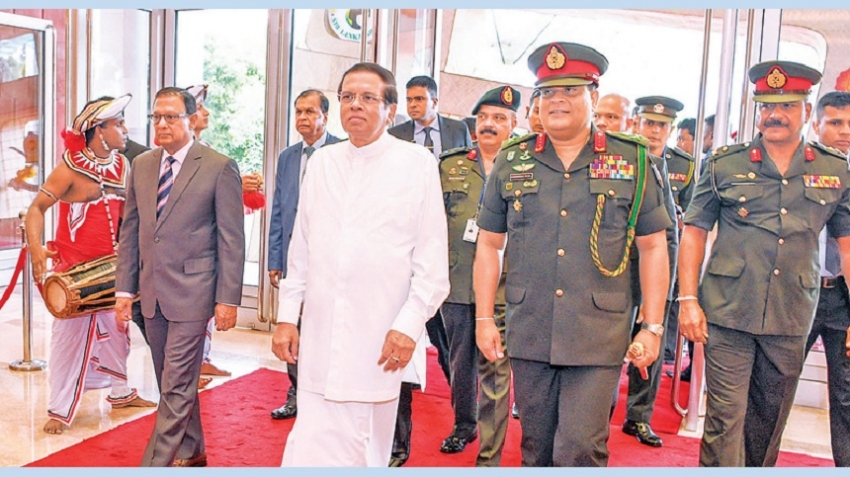The traditional oil lamp was lit by President Maithripala Sirisena, together with the Secretary of Defence, Chief of Defence Staff, Army, Navy and Air Force Commanders and Director General Training of the Army. The welcome address was delivered by the Army Commander Lt. General Shavendra Silva and General (Retd) Shantha Kottegoda, Secretary Defence made the opening remarks.In his welcome speech Lieutenant General Shavendra Silva, highlighted the importance of broadening horizons of knowledge on defence, security and challenges that prevail in the contemporary global security scenario.“It is not only an effort to share victorious gains but also to learn about debacles and it is an exercise to receive and process information among like-minded nations. Future threats and challenges need to be resolved in line with most modern triple bottom line concept, etc where new challenges are identified. This broadened discourse focuses on the scope of security and its challenges would certainly generate a forum that would stimulate critical thinking on geo-strategic security matters. These carefully articulated themes would analyze emerging threats and disruptions, to which the armed forces are the first to respond in any land. It also provides a platform which could shed light on promotion of military excellence,” the Commander of the Army observed, after extending a very warm welcome to all the delegates.
Secretary of Defence General (Retd) Shantha Kottegoda, in his welcome address, said counter terrorism was today the hot topic in the global agenda more than ever before.“The peace loving world is being constantly and continuously troubled by a wide range of terrorist threats, from organized terrorist organizations with global reach to self-motivated individual fighters. A joint strategy is much more workable than individual efforts in combatting terrorism as most of the threats we face today are emerging from beyond our territorial limits and jurisdictions. Such joint strategies should be with outward focus to address capacity building projects in areas such as gender equity, youth engagement, education and skill development, as a means to prevent and counter violent extremism conducive to terrorism,” Kottegoda said.
He pointed out that over the past years, the number and the magnitude of terrorist attacks, and the escalating count of victims and their geographical scale have increased rapidly, and terrorism has become an unprecedented threat to international peace, security and development.“Terrorism aggravates perception of insecurity and can lead to repeated outbreaks of violence, which hinder sustained economic growth. By exploiting development challenges such as inequalities, poverty and poor governance, terrorism further aggravates these grievances and creates a vicious cycle of decline, which affects marginalized groups in particular. No country is immune to this threat, nor can countries resolve this problem single handedly. Better cooperation among the states to monitor and halt terrorists travel and eliminate safe havens is needed.
The traditional concerns of security have also changed with globalization. So called “non-traditional” security issues such as unregulated migration, human trafficking, drug running, intellectual property theft have become major transnational concerns.”The Defence Secretary also noted that recruitment and exploitation of children by terrorists was a serious issue, which needed to be addressed through specific responses upholding the rights of children, and addressing them primarily as victims of terrorism, rather than perpetrators. “Victims of terrorism can play an important role in the prevention and building of social resilience by staging their stories and disreputable impacts of terrorism.”
“Developing countries thus need special assistance and support in upgrading their digital technology knowhow to keep pace with and counter its accelerating and increasing sophisticate use by terrorists,” he said. The host of participants and foreign delegates attending the Seminar included diplomats, Military officers, foreign envoys, Provincial Governors, retired Army Chiefs, defence attachés, Ministry Secretaries, and scholars.




















